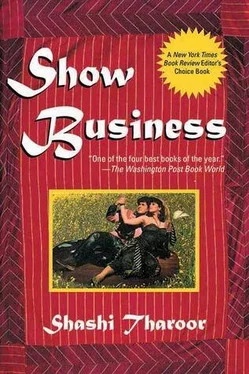Shashi Tharoor
Show Business
For my sisters
Shobha and Smita
in fulfillment of a twenty-year-old promise
to take them to the movies

Interior: Day
I can’t believe I’m doing this.
Me, Ashok Banjara, product of the finest public school in independent India, secretary of the Shakespeare Society at St. Francis’ College, no less, not to mention son of the Minister of State for Minor Textiles, chasing an aging actress around a papier-mâché tree in an artificial drizzle, lip-synching to the tinny inanities of an aspiring (and highly aspirating) playback-singer. But it is me, it’s my mouth that’s moving in soundless ardor, it’s my feet that are scudding treeward in faithful obeisance to the unlikely choreography of the dance director. Move, step, turn, as sari-clad Abha, yesterday’s heartthrob, old enough to be my mother and just about beginning to show it, nimbly evades my practiced lunge and runs, famous bust outthrust, to the temporary shelter of an improbably leafy branch. I follow, head tilted back, arms outstretched, pretending to sing:
I shall always chase you
To the ends of the earth,
I want to embrace you
From Pahelgaon to Perth,
My love!
My arms encircle her, but, as my fingertips meet, she ducks, dancing, and slips out of my clutches, pirouetting gaily away. Drenched chiffon clings to the pointed cones of her blouse, but she raises one end of the soaked sari pallav to half cover her face, holding the edge across the bridge of her perfect nose in practiced coyness. Her large eyes imprison me, then blink in release. Despite myself, I marvel. She has done this for twenty years; it is my first attempt.
I shall always chase you
From now ‘til my rebirth
And it’s only when I face you
That I feel I know my worth,
My love!
I shall always chase you,
I’ll never feel the dearth|
Of my desire to lace you
Around my —
“Cut!” I am caught in midgesture, midmovement, midword. The playback track screeches to a stop. I freeze, feeling as foolish as I imagine I must look. Abha snaps her irritation, turns away.
“No, no, no!” The dance director is waddling furiously toward me. He is fat and dark, but nothing if not expressive: his hands are trembling, his kohl-lined eyes are trembling, the layers and folds of flesh on his bare torso are trembling. “How many times I am telling you! Like this!” Hands, feet, and trunk describe arabesques of motion. “Not this!” He does a passable imitation of a stiff-necked paraplegic having a seizure. The technicians laugh. I smile nervously, looking furtively at my costar. Abha stands apart from us, hands on hips in a posture of fury. But am I imagining it, or is there something softer around her eyes as she looks at me?
I open hapless hands to the dance director, palms facing him in a gesture of concession. “OK, OK, Masterji. Sorry.”
“Sorry? Is my good name you will be ruining. What all is this, they will be saying. Gopi Master has forgotten what is dance.” His pectorals quiver in indignation. “For you maybe doesn’t matter. You are bachcha. I am having fifteen years in this business. What they will say about me, hanh?”
I shrug my embarrassment. I thought I’d done what I had been told to do, but that doesn’t seem the right thing to say. Gopi Master stamps his feet, one oily ringlet of black hair falling over a flashing red eye. He tosses his curls and strides off.
“OK, OK.” This is the director, Mohanlal. Mohanlal looks like a lower divisional clerk. He wears a fraying white cotton shirt, black trousers, thick glasses, and a perpetually harassed expression. Right now it is even more harassed than usual. I am evolving a Mohanlal Scale of High Anxiety, ranging from the pained visage with which he embarks on any second take (one on the scale) to the extreme angst that furrows his face when the producer-sahib visits and wants to know why the film isn’t finished yet (ten). My terpsichorean incompetence has him up to about five, but he is teetering on the edge of six. I try to look earnest and willing.
“OK,” says Mohanlal for the third time. “Let’s get back to this. Abhaji, I am sorry. Just once more, please, I promise you. Right, Ashokji? We’ll get it right this time.”
“Right,” I respond, without confidence.
“OK, clear the stage.” Mohanlal’s instructions emerge in the mildest tone, and one of the producer’s sidekicks, standing beyond the arc lights, claps his hands like a manual relay station to reinforce them. The clapper boy holds his board up for the start of the take. I grin at Abha, hoping for sympathy. She averts her gaze.
“Lights! Camera! Action!”
Ah, the magic of those words! I suppose that’s what brought me into this business in the first place. Years of amateur theater, from college productions of Charley }s Aunt and The Importance of Being Earnest to postdegree forays into Pinter and Beckett, had given me an irrevocable taste for greasepaint and footlights. Except, of course, that there was no money in it, and not much recognition either — unless you count the occasional notice in the Hindustan Times, sandwiched between a dance recital and an account of a Rotary Club speech. I spent months rehearsing foreign plays after work with other similarly afflicted ex-collegians and four evenings at a stretch putting them on for audiences of a few hundred Anglophile Delhiites, all for no reward other than a mildly bibulous cast party at which ignorant well-wishers poured pretentious praise into my rum. After half a dozen of these productions I decided I had had enough. But I couldn’t stop wanting to act, and when I discovered that I could no longer face going to the office without the prospect of rehearsals afterward, I realized what I had to do. I had to take the advice of my classmate Tool Dwivedi, as avid a cinephile as ever queued in dirty chappals and torn kurta for black market tickets to the latest releases. I had to go into films.
“Only real world there is, yaar,” Tool had said between lengthy drags on his chillum, before disappearing to Benares to study Hindu philosophy. I had not heard from him since, but his enthusiasm lingered. I decided to act on his idea.
“But it’s all so artificial,” Malini had protested when I told her of my plans. Malini was an afterwork thespian too — an account executive in an advertising firm in whom I was moderately interested.
“Artificial?” I asked incredulously. “What do you mean, artificial? Isn’t all acting artificial?”
“You know, all that running around trees, chasing heroines. Singing songs as you waltz through parks. You know what I mean.”
“That isn’t artificial, that’s mass entertainment.” She raised her untrimmed eyebrows and I decided to let her have it. “You want artificial, I’ll tell you what’s artificial. What we’re doing is artificial. Here, in Delhi, putting on English plays written for English actors, in a language the majority of our fellow Indians don’t even understand. What’s more artificial than that?”
“Are you telling me,” Malini bridled, “that our work in the theater, in the theater, is artificial, and what you want to do in” — she uttered the phrase with distaste — “Bombay films, is not?”
Читать дальше













